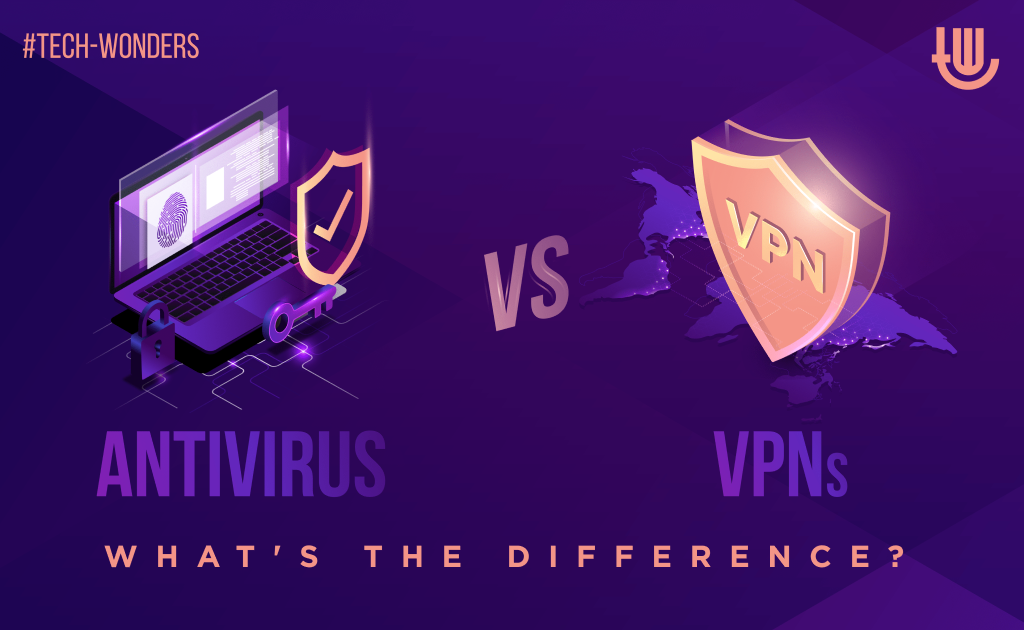
As threats from the Internet become more diverse, VPNs and antivirus programs offer comprehensive security solutions. As a result, their functions often overlap.
VPNs vs. antivirus: what’s the difference?
Antivirus programs protect the user’s device. This type of software monitors the computer and scans all new files for potential threats. On the other hand, a VPN is a tool that primarily focuses on protecting data during their transmission. It encrypts the information that is sent or received from your device.
What is an antivirus program?
The primary purpose of a modern antivirus program is device security. The software tries to detect and block malware or viruses that infect your phone or laptop. Good antivirus software should detect all types of malware: Trojans, keyloggers, crypto hackers, adware, and more. To do that, it collects information about threats around the world and then updates a virus database on your device. Of course, your antivirus must always be up to date for this process to work.
What are the benefits of an antivirus program?
Can you always be 100% sure a file or a link you are clicking on is safe? Antivirus programs allow you to make mistakes. If you accidentally click on a malicious link, your antivirus program can often detect it and remove it immediately. Below you will find more advantages of an antivirus program:
- Antivirus programs are extremely low-maintenance because they do practically everything themselves in the background.
- Many good antivirus programs are free or at least offer a free version. If you work with a Windows computer, for example, you already use an antivirus program.
- Sandbox mode. If you are unsure whether a file is safe, you can use sandboxes – secure virtual areas. In sandbox mode, you can open a file that you suspect is malicious without risking that your device will be infected.
What are the disadvantages of antivirus programs?
There aren’t many disadvantages to using a good antivirus. The programs primarily work in the background and have little to no impact on the performance of your device. However, using free antivirus software can be risky, as the companies behind it might turn their users’ information into money.
What is a VPN?
Like an antivirus, a VPN protects users from online threats. It encrypts the user’s Internet traffic and redirects it through a remote, secure server. In this way, the user’s IP address, location, and private information are hidden. Thus, a user’s private information remains protected from hackers, criminals, and even his ISP.
VPNs also work in the background, but they are usually easier to configure and turn off than traditional antivirus programs.
What are the advantages of a VPN?
If antivirus programs are a passive protection method, VPNs are the opposite. Here are some examples:
- Encryption of your traffic. Your data is protected because your network is secured with top-notch AES-256 encryption.
- Changing your location. VPNs let you watch streaming content that isn’t available in another country.
- More privacy. With a VPN, you can hide your browsing history from your ISP or keep data private from advertisers.
- Additional features. A good VPN usually has several additional useful features beyond simple encryption.
- Protects multiple devices at once. Premium VPN providers secure your connection on various devices, so you can even log into public WiFi securely.
What are the disadvantages of a VPN?
When you use a free VPN, you may encounter some risks and issues. These services are often more insecure than premium options like NordVPN. Your data may not be fully protected, and your internet speed will slow down.
To avoid this, make sure you use a trusted VPN. Free VPNs may claim that they offer the same benefits as paid providers, but that’s not true.
Can antivirus and VPN be used at the same time?
Both VPNs and antivirus programs protect your digital security, but they do so in different ways. And it doesn’t hurt to use them at the same time. Using an antivirus together with a VPN is the best thing you can do, as you’ll be protecting your device and your Internet connection twice.
Sometimes, the features offered by the VPN service and antivirus overlap. Some VPNs offer such a feature that blocks ads and malware websites and protects your device from botnets. At the same time, some premium antivirus programs may also include ad blockers and similar features.
Different problems, different solutions
Antivirus programs and VPN connections protect you from different threats, so both are useful. VPN features can protect you from various threats, such as tracking, man-in-the-middle attacks, and WiFi spying when you surf the Internet. If you do happen to click on a malicious link, your antivirus can step in and limit the damage to your device.
If you want a high level of online security, we recommend using these two tools. Antivirus software alone may not be enough, but it can provide excellent protection in combination with a premium VPN.